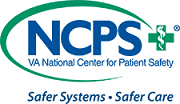VHA National Center for Patient Safety
About the National Center for Patient Safety
First Do No Harm
The Department of Veterans Affairs National Center for Patient Safety was established in 1999 to lead VA’s patient safety efforts and to develop and nurture a culture of safety throughout the Veterans Health Administration.
The primary goal of NCPS is the nationwide reduction and prevention of inadvertent harm to patients as a result of their care. Organizationally, NCPS is located within the Office of Quality and Patient Safety.
A National Team
NCPS’ multi-disciplinary team is headquartered in Ann Arbor, Mich. NCPS offers expertise on an array of patient safety and related health care issues. Patient safety officers at VA’s 21 regional health care systems and patient safety managers at 170 VA medical centers and other large facilities actively participate in the program.
Veterans Health Administration
NCPS is part of the VHA, the largest integrated health care system in the nation. The VHA serves the needs of America’s Veterans by providing primary and specialized care, as well as related medical and social support services. It supports innovation, empowerment, productivity and continuous improvement.
Taking a “Systems Approach”
The NCPS program is based on a systems approach to problem solving that focuses on prevention, not punishment. NCPS uses human factors engineering methods and applies concepts from high-reliability organizations, such as aviation, to target and eliminate system vulnerabilities.
Root Cause Analysis
NCPS uses a multi-disciplinary team approach, known as Root Cause Analysis (RCA), to study adverse medical events and close calls (sometimes called “near misses”). The goal of each RCA is to find out what happened, why it happened, and what must be done to prevent it from happening again. Training programs, cognitive aids, and companion software have been developed by NCPS to support facility RCA teams. Along similar lines, NCPS developed and implemented the Healthcare Failure Modes and Effect Analysis (HFMEA) process and other tools for health care professionals to use in proactive risk assessment and prevention of harm.
Confidential Reporting System
The NCPS Patient Safety Information System is a de-identified internal, confidential, and non-punitive reporting system. It allows NCPS to electronically document and analyze patient safety information from across VA so that lessons learned can benefit the organization.A systems approach to problem solving requires a willingness to report problems or potential problems so that solutions can be developed and implemented.
A combined total of more than 1,000,000 root cause analysis reports and safety reports have been entered into the reporting system since it was established 13 years ago. Willingness and an avenue to report problems or potential problems is essential to safe care because we can’t fix what we don't know about.
Publications
NCPS publishes safety alerts and safety advisories on specific issues relating to equipment, medications and procedures that might cause harm to our patients. Staff members have published more than 230 articles in external periodi-cals, such as The Archives of Surgery, Emergency Medicine Journal, and The Journal of the American Medical Association.NCPS also publishes a bimonthly newsletter, Topics in Patient Safety® (TIPS), that discusses a wide range of patient safety issues. An archive of all TIPS issues, 2001 to present, is available on the NCPS Web site.
Patient Safety Training
NCPS’ inclusive patient safety training program has been attended by more than 2,600 VA caregivers at the 39 sessions conducted since November 1999. Professionals from 285 domestic health care institutions or agencies have also attended, including representatives from the Department of Defense, the American College of Surgeons, and the University of Michigan. Internationally, we have trained representatives from 12 foreign nations, including Denmark and Australia, which subsequently implemented national programs based on the VA model.




















